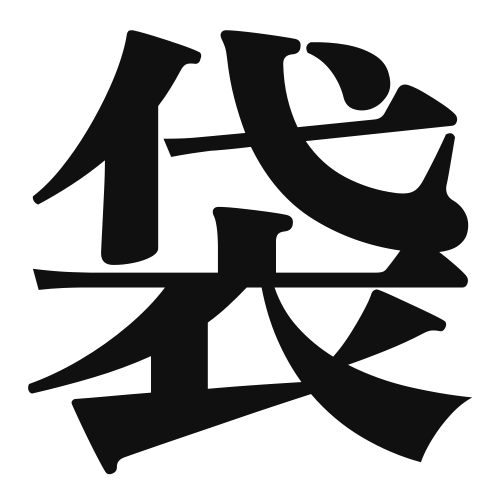1. Overview of Meaning
The kanji “袋” (fukuro) means “bag” or “sack.” It refers to a container made of flexible material, typically used for carrying or storing items.
2. Formation and Radical
Formation of the Kanji: The kanji “袋” is a compound character (会意文字) that combines elements to convey its meaning. The top part represents a cover or lid, while the bottom part suggests a bag or pouch.
Radical: The radical for “袋” is “衣” (clothing), which is often associated with items that can hold or contain things, reflecting the function of a bag.
3. Examples of Usage
Common Words and Phrases: Some frequently used words that include “袋” are:
- ゴミ袋 (gomi-bukuro) – garbage bag
- お弁当袋 (obento-bukuro) – lunch bag
- 風呂敷袋 (furoshiki-bukuro) – wrapping cloth bag
Example Sentences in Daily Conversation:
- 「この袋にお菓子を入れてください。」(Kono fukuro ni okashi o irete kudasai.) – “Please put the snacks in this bag.”
- 「買い物のために袋を持ってきました。」(Kaimono no tame ni fukuro o motte kimashita.) – “I brought a bag for shopping.”
4. Synonyms and Antonyms
Similar Kanji: A similar kanji is “箱” (hako), which means “box.” While both are containers, “袋” refers to a flexible bag, whereas “箱” refers to a rigid box.
Opposite Kanji: An antonym could be “空” (kara), meaning “empty.” While “袋” implies a container that holds items, “空” suggests the absence of contents.
5. Cultural and Historical Background
Relation to Japanese Culture: In Japan, bags are not only practical but also have cultural significance. For example, furoshiki (風呂敷) is a traditional wrapping cloth used to carry items, showcasing the importance of presentation and sustainability.
Proverbs and Idioms: One common saying is “袋小路” (fukuro-kouji), meaning “dead end,” which literally translates to “bag alley,” symbolizing a situation with no way out.
